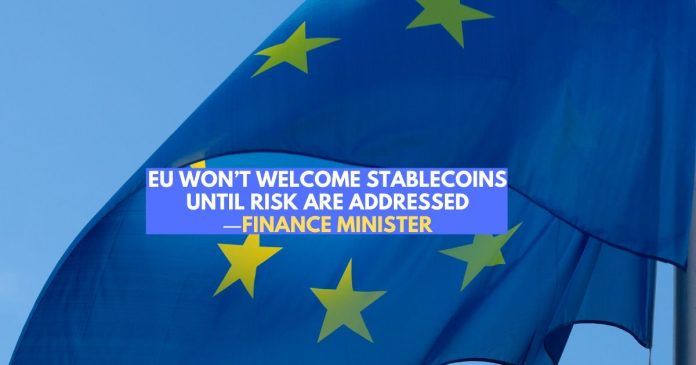European Union (EU) finance ministers have reiterated the union’s stance on stablecoins. The latter need to tackle the risks they pose to monetary sovereignty.
According to EU authorities, no global stablecoin project will begin operation in Europe unless the risk issue is addressed. Accordingly, a joint statement released by the European Council and Commission reads: “Until the legal, regulatory and oversight challenges and risks have been adequately identified and addressed no global ‘stablecoin’ arrangement should begin operation in the European Union.”
The EU and the European Commission (EC) said they were ready to set-up necessary measures to ensure the execution of this law. Which includes setting appropriate standards of consumer protection and orderly monetary financial conditions.
The statement further held that the EU recognizes the benefits of crypto technology such as faster payments across borders. However, they also have “weak links” like consumer privacy, cybersecurity, money laundering, terrorism financing, among others.
The decision of the bloc aligns with the strict stance on Libra. EU Finance Commissioner Valdis Dombrovskis said that the EU won’t accept stablecoins. For this, it needs to regulate the risks. However, a senior government official in Lithuania has contradicted the commissioner’s statement. Saying the regulation won’t stop stablecoin operators from proceeding with their plans as the EU is not against simplified payments.
He added that since the public session meeting in Brussels the EC is already amending rules to regulate digital currency.
Central Bank Digital Currencies (CBDCs)
The continued struggle between countries and crypto organization has seen some countries tilt toward creating their own digital currencies.
Notably, countries like France, Russia, Canada, the United Kingdom, Tunisia, Norway, among others have hinted on creating its own cryptocurrency. For instance, the French Central Bank has tweeted that it needs to rigorously consider all factors when creating such a digital asset.
Autre sujet crucial : l’éventuelle création d’une monnaie digitale de banque centrale. « Nous devons apporter notre pierre à l’édifice de cette innovation, mais de manière sérieuse et méthodique », François Villeroy de Galhau à la conférence de l’#ACPR cc @ACPR_actu
— Banque de France (@banquedefrance) December 4, 2019
Concurrently, some EU ministers have applauded the European Central Bank’s idea to explore creating a public digital currency. The ECB said a public digital currency might be needed if payments within Europe remain costly. And its adoption could be accelerated if the use of cash declines.




























